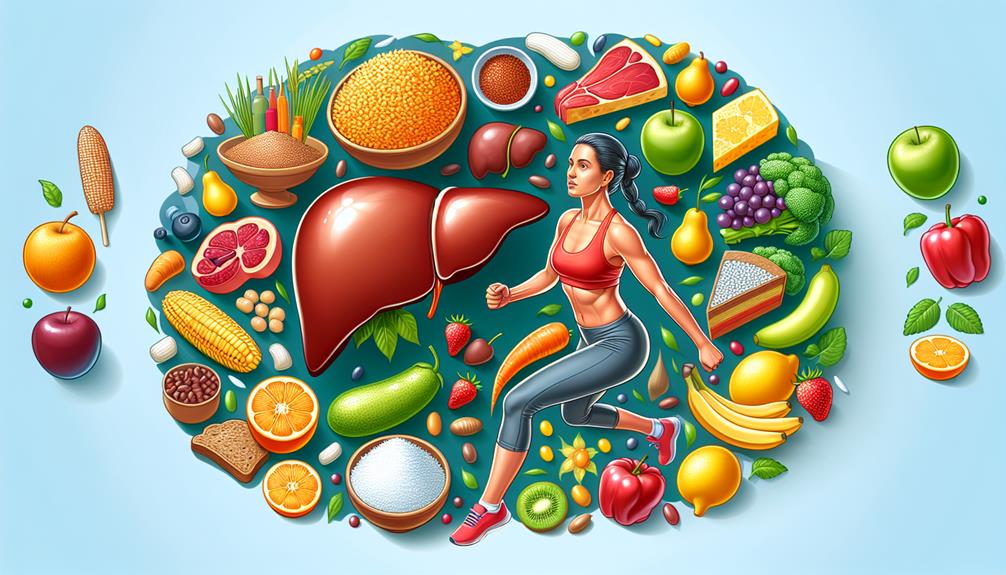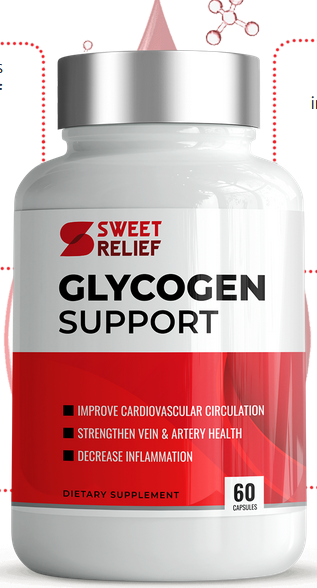Managing the rollercoaster of blood sugar levels isn’t just about holding on tight; it’s about finding your balance. You’ve likely heard that maintaining stable glycogen stores is vital, but you might not know how essential it is for your everyday energy and long-term health. By integrating glycogen-supporting habits and supplements into your routine, you can help manage those unpredictable spikes and drops that affect your mood and energy. Curious about how simple adjustments could streamline your metabolic health and sharpen your mental clarity? Well, consider what changes you might make to your diet and exercise regimen to stabilize your energy reservoir.
Key Takeaways
- Glycogen support supplements maintain blood glucose levels, enhancing energy and mental clarity.
- Consuming glucose, fructose, and maltodextrin helps replenish glycogen stores efficiently.
- Balanced blood sugar prevents spikes and drops, stabilizing mood and energy.
- Tailored glycogen support aligns with individual metabolic demands for optimal health.
- Regular intake of electrolytes and amino acids supports cellular function and muscle recovery.
Understanding Glycogen Support

To effectively manage your energy and blood sugar levels, it’s essential to understand how glycogen support functions within the body. Glycogen, a multibranched polysaccharide of glucose, serves as a pivotal energy reserve in muscle tissues and the liver. Its regulation is important for maintaining stable blood glucose levels, especially in scenarios where dietary glucose isn’t immediately available.
During periods of physical activity, your body taps into muscle glycogen stores for rapid energy production. This process is important for sustaining exercise performance, as it provides the glucose necessary to generate ATP (adenosine triphosphate), the energy currency of your cells. Therefore, well-maintained glycogen storage is directly linked to your ability to perform prolonged or intense exercise.
Moreover, in the context of fasting or when you’re not consuming food for extended periods, liver glycogen plays a critical role. It breaks down into glucose which is then released into the bloodstream, ensuring that your blood glucose levels remain balanced. This fasting benefit is essential for preventing hypoglycemia (low blood sugar levels), which can lead to fatigue, dizziness, and even unconsciousness.
For individuals managing conditions like diabetes, efficient glycogen support helps mitigate sudden spikes and drops in blood glucose. This is achieved through the regulatory actions of insulin, which promotes the conversion of excess glucose into glycogen for future use. By understanding and managing your glycogen levels, you enhance your body’s efficiency in energy utilization and blood sugar regulation, contributing to overall metabolic health and stability.
Benefits of Balanced Blood Sugar
Understanding how glycogen support functions within the body helps pave the way for appreciating why maintaining balanced blood sugar levels is key to your overall health. By stabilizing these levels, you’re not just avoiding energy crashes and mood swings; you’re also fostering a strong mind-body connection. This connection is essential as it enhances your mental clarity and emotional stability, making daily stress more manageable and improving your cognitive performance.
Balanced blood sugar plays a pivotal role in energy regulation. Stable glucose levels guarantee a consistent supply of energy, which prevents the fatigue that typically follows sugar highs and lows. This regulation is crucial for sustained mental and physical activities, supporting your productivity and overall vitality throughout the day.
Moreover, the equilibrium of blood sugar aids in hormone balance. Fluctuating blood sugar can lead to spikes and crashes in hormones like insulin and cortisol, which not only disrupts your metabolic processes but can also lead to longer-term health issues like Type 2 diabetes. By maintaining a steady blood sugar level, you’re helping to keep these hormones stable, which supports overall endocrine health.
Controlling your blood sugar also curbs sugar cravings, which are often a result of sudden drops in glucose levels. These cravings can lead to overeating and choosing less nutritious foods, thereby impacting your nutrient absorption. Effective glycogen support ensures that your body efficiently utilizes the nutrients from your diet, promoting better health and preventing nutrient deficiencies that can occur from poor dietary choices. Balanced blood sugar is essential not just for your immediate energy needs but for long-term metabolic and physiological health.
Key Ingredients Explained

Frequently, glycogen support supplements incorporate essential ingredients like glucose, fructose, and maltodextrin, which are pivotal for replenishing your body’s glycogen stores. These simple carbohydrates are quickly absorbed, providing a rapid source of energy replenishment essential during and post high-intensity activities. This swift infusion of glucose into your bloodstream is important not only for energy but also for initiating muscle recovery processes.
Delving deeper, the importance of electrolyte balance cannot be overstated. Ingredients like sodium, potassium, and magnesium in these supplements play critical roles. They help maintain cellular function and hydration levels, which are often compromised during strenuous exercise. The right electrolyte mix can prevent cramping and facilitate better muscle function and recovery.
Moreover, amino acid support is another cornerstone of effective glycogen supplements. Amino acids such as glutamine and branched-chain amino acids (BCAAs) are frequently included to aid in the repair and recovery of muscle tissue. These components help mitigate muscle breakdown during exercise, speed up recovery, and support protein synthesis in your muscles, which is essential after the stress of physical activities.
It’s also important to recognize that glycogen support isn’t a one-size-fits-all solution. The specific ratio and combination of glucose, fructose, maltodextrin, electrolytes, and amino acids can vary significantly to meet individual needs. Factors like your overall health, activity level, and metabolic demands influence the formulation that would work best for you, ensuring tailored nutritional support that aligns with your personal health and fitness goals.
Managing Blood Pressure Naturally
Managing your blood pressure naturally involves incorporating a diet abundant in fruits, vegetables, whole grains, and lean proteins, which can greatly aid in maintaining healthy blood pressure levels. In addition to diet, regular physical activity is vital. Activities like walking, cycling, or swimming not only help lower blood pressure but also enhance your overall cardiovascular health.
Herbal remedies are another facet you can explore. Herbs such as hawthorn, garlic, and dandelion have been used traditionally to support blood pressure management. They work by improving arterial health and reducing water retention. However, it’s important to consult with a healthcare provider before starting any herbal regimen to make sure it’s appropriate for your specific health condition.
Nutritional supplements like magnesium, potassium, and omega-3 fatty acids are also beneficial. These supplements help relax your blood vessels and improve heart function, which in turn helps in managing blood pressure levels. Remember, these should complement, not replace, a healthy diet.
The mind-body connection plays a significant role too. Techniques such as yoga, meditation, and deep-breathing exercises can reduce stress, which is often a contributor to high blood pressure. Incorporating these practices into your daily routine can help maintain a calm and stable bodily state, aiding blood pressure control.
Here’s a quick guide to help you get started:
| Strategy | Description | Frequency |
|---|---|---|
| Physical Activity | Engage in 30 mins of moderate exercise | Daily |
| Nutritional Supplements | Magnesium, Potassium, Omega-3 | As recommended |
| Herbal Remedies | Hawthorn, Garlic, Dandelion | Consult doctor |
| Mind-Body Techniques | Yoga, Meditation, Deep-breathing | Regularly |
| Diet | Fruits, Vegetables, Whole grains, Lean proteins | Every meal |
Lowering Bad Cholesterol

While strategies for managing blood pressure naturally are essential, it’s equally important to focus on reducing bad cholesterol, known scientifically as LDL cholesterol, to further protect your cardiovascular health. Lowering your LDL cholesterol is vital as high levels are linked to an increased risk of heart disease and stroke due to plaque buildup in your arteries.
Cholesterol management begins with thorough lifestyle changes. You’ve got to adjust your diet to include heart-healthy foods. Nutrition tips often recommend increasing your intake of soluble fiber and omega-3 fatty acids, which can be found in foods like oats, flaxseeds, salmon, and walnuts. These nutrients help reduce the absorption of cholesterol into your bloodstream.
Exercise benefits your heart health by increasing the efficiency of your cardiovascular system and helping raise HDL (good) cholesterol levels, which aids in transporting LDL cholesterol to your liver where it can be processed and removed from your body. Aim for at least 150 minutes of moderate-intensity aerobic exercise, such as brisk walking or cycling, every week.
Moreover, other lifestyle changes include quitting smoking and reducing alcohol consumption, both of which have a significant impact on your cholesterol levels and overall cardiovascular health. Smoking lowers HDL cholesterol, while excessive drinking can lead to higher levels of LDL cholesterol.
Increasing Good Cholesterol
Increasing your HDL cholesterol, often referred to as ‘good’ cholesterol, is essential for transporting LDL, or ‘bad’ cholesterol, away from your arteries, thereby reducing your risk of heart disease. Effective management of your HDL levels involves a combination of dietary strategies, lifestyle modifications, specific exercise routines, and potentially the use of supplement options.
Dietary strategies play an important role in boosting HDL levels. Research findings suggest that incorporating foods rich in omega-3 fatty acids, such as salmon and flaxseeds, can notably increase HDL cholesterol. Additionally, using olive oil and consuming a moderate amount of nuts are dietary habits that contribute positively to your HDL levels.
Lifestyle changes, including quitting smoking and limiting alcohol intake, have been shown to effectively raise HDL cholesterol. These actions not only contribute to better cholesterol management but also enhance overall cardiovascular health.
Regular physical activity is another powerful tool. Exercise routines such as aerobic exercises, strength training, and high-intensity interval training (HIIT) have been proven to elevate HDL cholesterol levels. Consistency in these activities is key, as regular exercise yields better results in terms of HDL improvement.
Supplement options also exist to aid in increasing HDL cholesterol. For instance, supplements containing niacin (vitamin B3) have been documented to boost HDL levels. However, it’s important to consult with a healthcare provider before starting any new supplement regimen.
Implementing these strategies collectively can lead to notable improvements in your HDL cholesterol levels, thereby enhancing your heart health and reducing the risk of cardiovascular diseases.
Reversing Insulin Resistance

To effectively combat insulin resistance, it’s important to understand that this condition stems from cells becoming less responsive to insulin, which is essential for regulating blood sugar levels. You can reverse this through strategic interventions focused on key areas such as diet, exercise, and overall lifestyle modifications. Let’s explore further.
| Strategy | Description |
|---|---|
| Dietary modifications | Incorporate whole foods, minimize sugars and refined carbs, and boost intake of fibers and healthy fats to improve insulin sensitivity. |
| Exercise routine | Regular physical activity, especially strength training and aerobic exercises, can enhance your cells’ responsiveness to insulin. |
| Lifestyle changes | Reducing stress through techniques like mindfulness or yoga, and ensuring adequate sleep plays a critical role in managing insulin resistance. |
| Blood sugar monitoring | Regularly check your blood glucose levels to track the effectiveness of your management strategies and adjust accordingly. |
| Healthcare guidance | Consult with healthcare providers to tailor a plan specific to your health needs, including possible medication adjustments. |
Understanding and implementing these strategies can greatly help in reversing insulin resistance. Dietary modifications ensure you’re feeding your body the right nutrients, while an exercise routine improves your metabolic health. Lifestyle changes address external factors that may exacerbate insulin resistance, such as stress and poor sleep patterns. Regular blood sugar monitoring keeps you informed about your progress. Finally, continuous healthcare guidance ensures that your approach is medically sound and adapted to your evolving health status. By focusing on these areas, you’re taking a well-rounded approach to manage and potentially reverse insulin resistance.
Promoting Healthy Weight Loss
Promoting healthy weight loss is essential, as it not only enhances blood sugar control in individuals with diabetes but also reduces overall insulin resistance. Effective weight management plays a pivotal role in maintaining ideal blood glucose levels, which is vital for mitigating the risks associated with diabetes and other metabolic disorders. By focusing on losing even a small amount of weight, you can see significant improvements in your body’s ability to regulate blood glucose effectively.
An effective exercise regimen is a cornerstone of any weight loss strategy. Regular physical activity helps increase insulin sensitivity, which allows your cells to use the available blood glucose more efficiently. This not only helps in lowering blood glucose levels but also aids in burning excess fat, thereby supporting weight loss. Incorporating both aerobic and resistance training into your routine can maximize these benefits.
A nutritious diet is equally important. Consuming a balanced diet rich in fiber, proteins, and healthy fats can help manage your appetite and calorie intake, which is essential for weight management. Foods with low glycemic indices are particularly beneficial as they cause a slower rise in blood glucose levels, aiding in better blood sugar control.
Adopting a sustainable lifestyle that includes regular exercise and a nutritious diet is the key to long-term success in weight management and blood glucose control. Sustainability ensures that the changes you make are practical and can be maintained over time, thereby providing lasting benefits to your health. By committing to these lifestyle changes, you’re not just losing weight; you’re setting the foundation for a healthier life.
Usage and Dosage Recommendations

Before adjusting your glycogen intake, it’s essential to understand the specific dosage recommendations based on your individual health needs and activity levels. Typically, the general daily requirements for glycogen are around 500 grams for adults, but this can vary widely depending on your physical activity and metabolic demands.
For athletes or those engaged in high-intensity training, glycogen plays an important role in performance enhancement. It’s stored in your muscles and liver and is your body’s most readily available form of energy during exercise. Ensuring adequate pre-workout glycogen levels can greatly boost your energy output and endurance. Typically, consuming a carbohydrate-rich meal 3 to 4 hours before exercise can help optimize these pre-workout benefits.
Post-workout timing of glycogen intake is equally important. To facilitate rapid recovery and replenish glycogen stores, it’s recommended to consume carbohydrates within 30 minutes after finishing your workout. This window is when your muscles are most receptive to glucose uptake.
However, it’s important to tailor your glycogen intake to your individual needs. Factors such as body weight, metabolism, the intensity of the activity, and overall health goals must be considered. Consulting with a healthcare provider or nutritionist can provide personalized guidance, ensuring that you’re neither under-consuming nor over-consuming glycogen, which could hinder your health objectives.
Frequently Asked Questions
What Does Glycogen Supplement Do?
Just like a sports car needs premium fuel, your body needs glycogen supplements for peak performance. These supplements boost glycogen storage, acting as a quick energy source essential for muscle recovery. They enhance athletic performance by ensuring your muscles have the energy needed during intense activities. The benefits of this supplement extend to aiding in recovery post-workout, making it a valuable addition to your fitness regimen.
What Happens to Glycogen of Diabetic People?
In diabetes, your glycogen storage capacity is compromised due to impaired insulin action, affecting liver functionality and hormonal regulation. The rate of glycogenolysis in diabetics is often accelerated, which disrupts normal blood sugar levels. Additionally, you face significant glycogen synthesis challenges, as hormonal imbalances and insulin resistance inhibit the normal storage process of glycogen in your liver and muscles, leading to further complications in managing your condition effectively.
How Can I Flush My Blood Sugar Fast?
To quickly flush out high blood sugar, think of your body as a finely tuned car—dietary adjustments and exercise are your best fuel. Opt for high-fiber foods and engage in regular physical activity to help muscles use glucose more efficiently. Don’t underestimate the power of hydration and stress management; both can greatly impact blood sugar levels. Finally, make sure your sleep patterns are consistent, as poor sleep can disrupt glucose metabolism.
How Does Glucagon Help Control the Level of Glucose in Your Blood?
Glucagon plays an important role in managing your blood glucose levels by signaling your liver to release stored glucose. This hormone functions as a counter-regulatory mechanism to insulin, ensuring that your blood sugar levels don’t dip too low. Its interaction with other hormones helps maintain glucose homeostasis, particularly during periods of fasting or increased energy demand. Understanding glucagon’s regulation mechanisms and liver response is key to managing blood sugar effectively.


